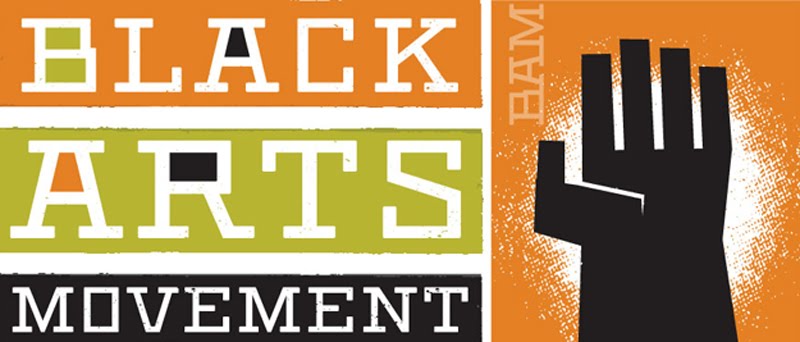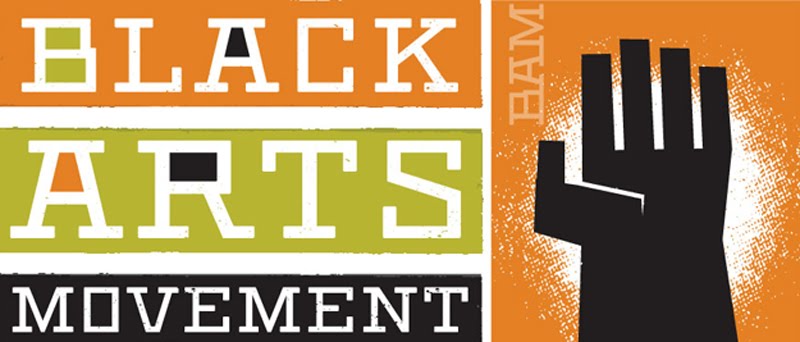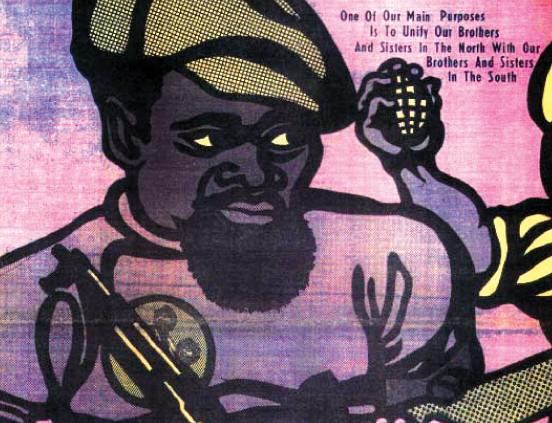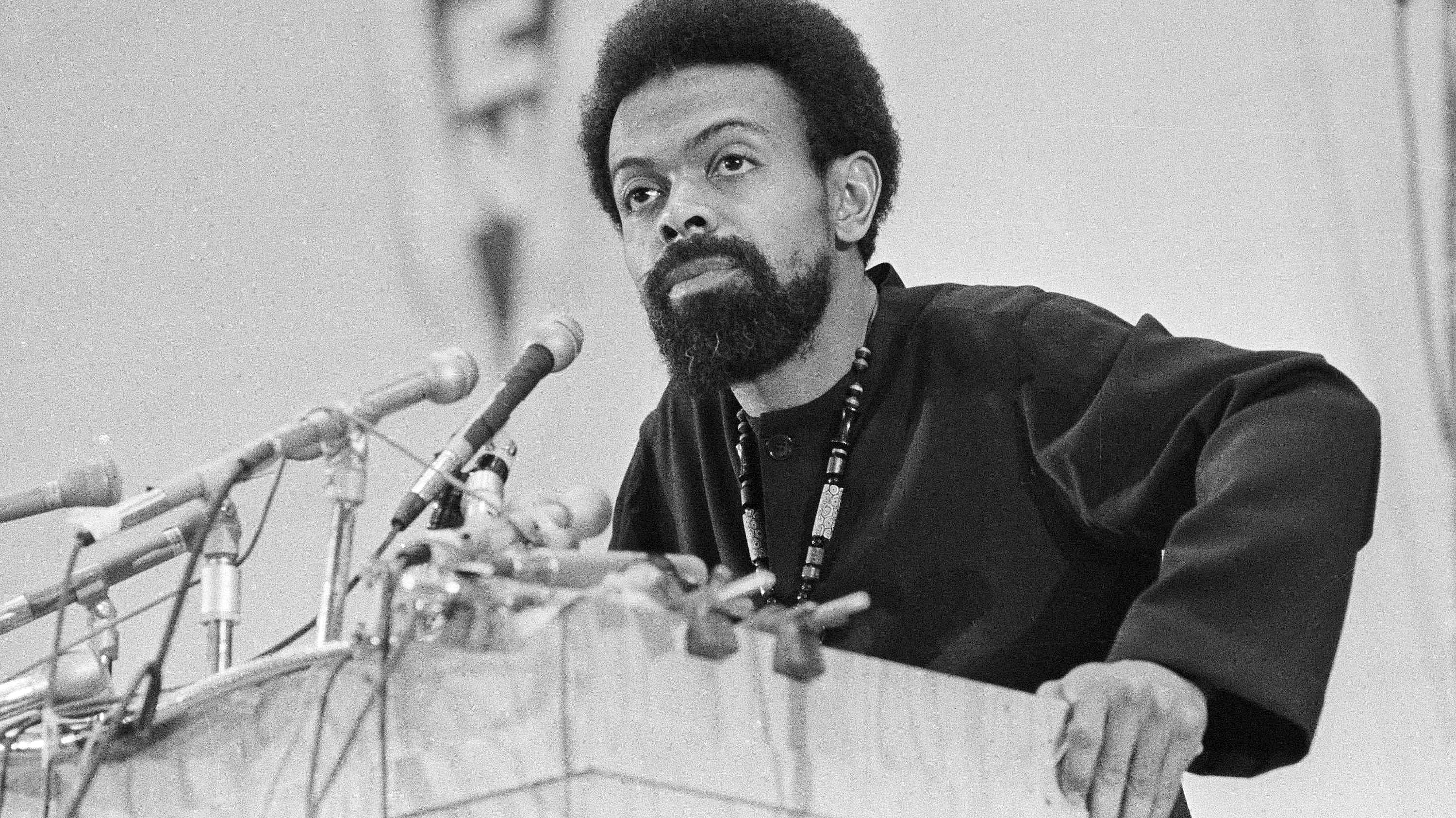
Good Morning POU!

“Sometimes referred to as ‘the artistic sister of the Black Power Movement,’ the Black Arts Movement stands as the single most controversial moment in the history of African-American literature—possibly in American literature as a whole. Although it fundamentally changed American attitudes both toward the function and meaning of literature as well as the place of ethnic literature in English departments, African-American scholars as prominent as Henry Louis Gates, Jr., have deemed it the ‘shortest and least successful’ movement in African American cultural history.” —“Black Creativity: On the Cutting Edge,” Time (Oct. 10, 1994)
The artists within the Black Arts movement sought to create politically engaged work that explored the African American cultural and historical experience and transformed the way African Americans were portrayed in literature and the arts.

While the Black Arts movement certainly wasn’t limited to poetry, poetry was the genre that saw the most expansion and growth at the time. Like the members of the Harlem Renaissance, Black Arts writers also crafted a black voice that drew on African American vernacular, songs, and sermons in free verse that was experimental, incorporating jazz, the blues, and many linguistic and rhythmic techniques also characteristic of the Beat movement.
One of the most important figures in the Black Arts movement was Amiri Baraka (formerly LeRoi Jones), who began his career among the Beat generation, living in Greenwich Village and associating with poets such as Allen Ginsburg and Charles Olson. Following the assassination of Malcolm X in 1965, Baraka made a symbolic move from Manhattan’s Lower East Side to Harlem, where he founded the Black Arts Repertory Theatre/School, the most important institution of the movement. According to the Norton Anthology of African American Literature, “No one was more competent in the combination of the experimental and the vernacular than Amiri Baraka, whose volume Black Magic Poetry 1961-1967(1969) is one of the finest products of the African American creative energies of the 1960s.” Baraka also became known for his Dutchman, a shocking one-act play that was charged with symbolism and a radical black consciousness.

Baraka was born Everett LeRoi Jones in Newark, NJ. He won a scholarship to Rutgers University in 1951, but a continuing sense of cultural dislocation prompted him to transfer in 1952 to Howard University, from which, in 1954, he earned a Bachelor of Arts in English.
In 1954, he joined the US Air Force as a gunner, reaching the rank of sergeant. His commanding officer received an anonymous letter accusing Baraka of being a communist. This led to the discovery of Soviet writings in Baraka’s possession, his reassignment to gardening duty and subsequently a dishonorable discharge for violation of his oath of duty. He later described his experience in the military as “racist, degrading, and intellectually paralyzing.” While he was stationed in Puerto Rico, he worked at the base library which allowed him ample reading time and it was here that, inspired by Beat poets back in America, he began to write poetry.
The same year, he moved to Greenwich Village working initially in a warehouse for music records. He came into contact with avant-garde Black Mountain and New York School poets. In 1958 he married Hettie Cohen who described herself as an outcast of her Jewis family, with whom he had two daughters, Kellie Jones (b. 1959) and Lisa Jones (b.1961). He and Hettie founded Totem Press, which published such Beat icons as Jack Kerouac and Allen Ginsberg.
Baraka also worked as editor and critic for the literary and arts journal Kulchur (1960–65). With Diane di Prima he edited the first twenty-five issues (1961–63) of their little magazine The Floating Bear. In the autumn of 1961 he co-founded the New York Poets Theatre with di Prima, choreographers Fred Herko and James Waring, and actor Alan S. Marlowe. He had an extramarital affair with Diane di Prima for several years; their daughter, Dominique di Prima, was born in June 1962.
Baraka visited Cuba in July 1960 with a Fair Play for Cuba Committee delegation and reported his impressions in his essay “Cuba Libre”. There he encountered openly rebellious artists who declared him to be a “cowardly bourgeois individualist” more focused on building his reputation than trying to help those who were enduring oppression. This encounter caused a dramatic change in his writing and goals, causing him to become emphatic about supporting black nationalism.
In 1961 Baraka co-authored a Declaration of Conscience in support of Fidel Castro‘s regime. Baraka also was a member of the Umbra Poets Workshop of emerging Black Nationalist writers (Ishmael Reed, and Lorenzo Thomas among others) on the Lower East Side (1962–65).
In 1961 a first book of poems, Preface to a Twenty Volume Suicide Note, was published. Baraka’s article “The Myth of a ‘Negro Literature'” (1962) stated that “a Negro literature, to be a legitimate product of the Negro experience in America, must get at that experience in exactly the terms America has proposed for it in its most ruthless identity.” He also states in the same work that as an element of American culture, the Negro was entirely misunderstood by Americans. The reason for this misunderstanding and for the lack of black literature of merit was according to Baraka:
In most cases the Negroes who found themselves in a position to pursue some art, especially the art of literature, have been members of the Negro middle class, a group that has always gone out of its way to cultivate any mediocrity, as long as that mediocrity was guaranteed to prove to America, and recently to the world at large, that they were not really who they were, i.e., Negroes.
As long as black writers were obsessed with being an accepted middle class, Baraka wrote, they would never be able to speak their mind, and that would always lead to failure. Baraka felt that America only made room for white obfuscators, not black ones.
In 1963 Baraka (under the name Jones) published Blues People: Negro Music in White America, his account of the development of black music from slavery to contemporary jazz. When the work was re-issued in 1999, Baraka wrote in the Introduction that he wished to show: “The music was the score, the actually expressed creative orchestration, reflection of Afro-American life…. That the music was explaining the history as the history was explaining the music. And that both were expressions of and reflections of the people.” Baraka argued that though the slaves had brought their musical traditions from Africa, the blues were an expression of what black people became in America: “The way I have come to think about it, blues could not exist if the African captives had not become American captives.”
Baraka (under the name Jones) authored an acclaimed, controversial play Dutchman, in which a white woman accosts a black man on the New York subway. The play premiered in 1964 and received the Obie Award for Best American Play in the same year. A film of the play, directed by Anthony Harvey, was released in 1967. The play has been revived several times, including a 2013 production staged in the Russian and Turkish Bathhouse in the East Village, Manhattan.
Clip from Dutchman “White Women Are Dangerous”
In January 1965, Baraka had a 12-hour meeting with Malcolm X, where the then-head of the Organization of Afro-American Unity spoke with the poet about his vision for black power. A month later, Malcolm X was murdered.
Baraka left Hette Jones in what he later described as a fit of racial guilt and formed the Black Arts Repertory Theater in Harlem in 1965. Then, after a scandal involving funding (he was accused of using federal anti-poverty money to stage plays ), he moved back to Newark. He and his new wife, later known as Amina Baraka, opened Spirit House, a combination playhouse and artists’ residence.
He was charged with weapons possession. But after legal proceedings that dragged on for several years, he was found not guilty. Most who reviewed the evidence, which included ballistics reports that showed the guns he was accused of possessing had never been fired, surmised the police had grabbed the wrong man and planted the evidence on Baraka. His poem “Black People”, published in the “Evergreen Review” of December 1967, was read by the judge in court, including the memorable phrase: “All the stores will open if you say the magic words. The magic words are: “Up against the wall motherfucker this is a stick up!” Shortly afterward an appeals court reversed the sentence based on his defense by attorney Raymond A. Brown. He later joked that he was charged with holding “two revolvers and two poems”.
Baraka became a leading advocate and theorist for the increase in black art during this time. Now a “black cultural nationalist,” he broke away from the predominantly white Beats and became very critical of the pacifist and integrationist Civil Rights movement. His revolutionary poetry now became more controversial. A poem such as “Black Art” (1965), according to academic Werner Sollors from Harvard University, expressed his need to commit the violence required to “establish a Black World”.
In 1968, having changed his name to Imamu Ameer Baraka, he was visited at Spirit House in Newark by Martin Luther King, who spoke to him about the need for greater solidarity among splintered black groups. Eight days later, King was gunned down.
His audience with King, similar to his meeting with Malcolm X, helped vault Baraka into new prominence on the national black power scene.
Meanwhile, he also was growing a movement within post-riot Newark, one that was both ideological and practical. In his book about the riots, “No Cause for Indictment,” Ron Porambo described Baraka at that time: “Leroi Jones is, despite his press clippings, essentially a mild-mannered man with the gentle sensitivity of an artist,” Porambo wrote. “He message, to be found in any high school civics textbook, is that meaningful change in Newark will only come from the ballot box.”
Baraka’s separation from the Black Arts Movement began during the 1970s. He saw certain black writers – capitulationists, as he called them – countering the Black Arts Movement that he created. He believed that the groundbreakers in the Black Arts Movement were doing something that was new, needed, useful, and black, and those who did not want to see a promotion of black expression were “appointed” to the scene to damage the movement.
Around 1974, Baraka became a Marxist and a supporter of third-world liberation movements.
In 1979 he became a lecturer in the State University of New York at Stony Brook‘s Africana Studies Department in the College of Arts and Sciences due to the urging of faculty member Leslie Owens.
In 1980 Baraka published an essay in the Village Voice that was titled Confessions of a Former Anti-Semite. Baraka insisted that a Village Voice editor entitled it and not himself. In the essay Baraka went over his life history including his marriage to Hettie Cohen who was of Jewish descent. He stated that after the assassination of Malcolm X he found himself thinking “As a Black man married to a white woman, I began to feel estranged from her … How could someone be married to the enemy?” So he divorced Hettie and left her with their two bi-racial daughters. In the essay Baraka went on to say “We also know that much of the vaunted Jewish support of Black civil rights organizations was in order to use them. Jews, finally, are white, and suffer from the same kind of white chauvinism that separates a great many whites from Black struggle. …these Jewish intellectuals have been able to pass over the into the Promised Land of American privilege.” In the essay he also defended his position against Israel saying “Zionism is a form of racism.” Near the end of the essay Baraka stated “Anti-Semitism is as ugly an idea and as deadly as white racism and Zionism …As for my personal trek through the wasteland of anti-Semitism, it was momentary and never completely real. …I have written only one poem that has definite aspects of anti-Semitism…and I have repudiated it as thoroughly as I can.”
Read more on the life of Amiri Baraka here.
